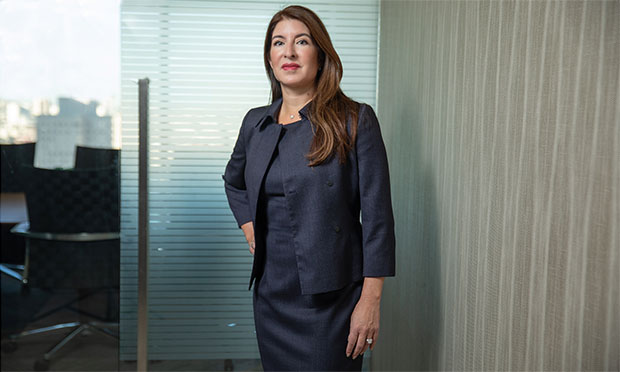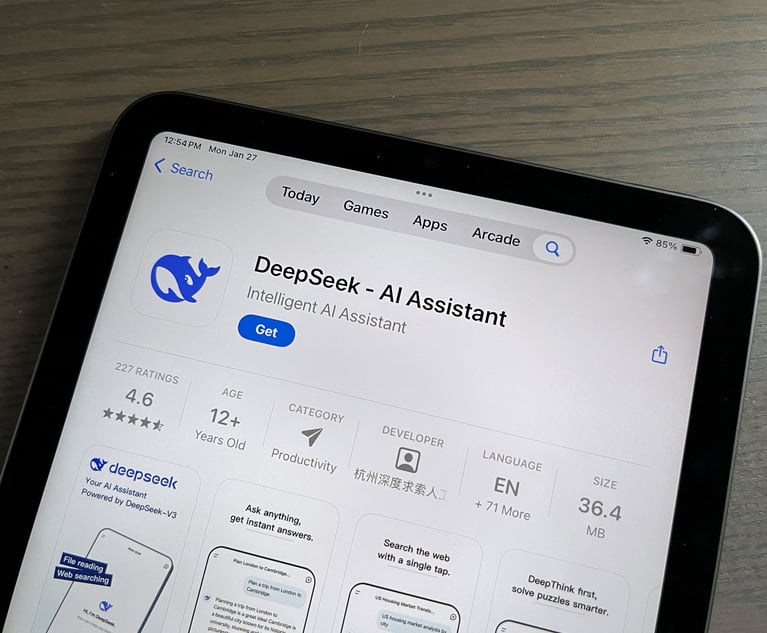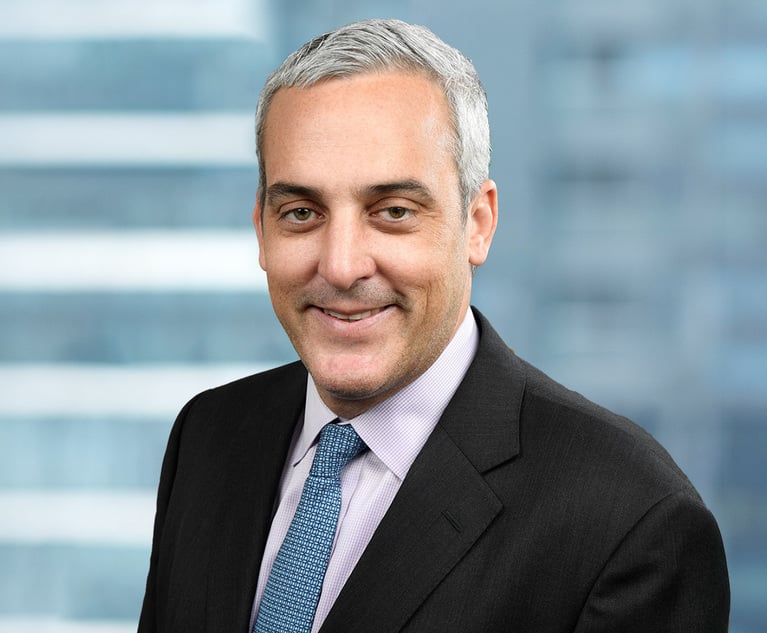Innovations in Diversity and Inclusion: Littler Mendelson
Over the past four years, minority associates in the firm's Career Advocacy Program represented 12% to 40% of each new shareholder class.
October 30, 2019 at 12:30 PM
4 minute read
 Natalie Pierce, Littler Mendelson shareholder. (Photo: Jason Doiy/ALM)
Natalie Pierce, Littler Mendelson shareholder. (Photo: Jason Doiy/ALM)
Littler Mendelson's Career Advocacy Program pairs minorities and attorneys who have identified themselves as LGBTQ or differently abled with firm leaders and general counsel of the firm's clients, including NBCUniversal, Verizon and others, for mentorship and leadership development. The program garnered the firm one of three Innovations in Diversity and Inclusion Awards that will be honored at the California Leaders in Tech Law and Innovation Awards. The Recorder recently caught up with Natalie Pierce, a San Francisco-based co-chair of the firm's Diversity and Inclusion Counsel who developed the program, to discuss how it came together.
The firm's Career Advocacy Program pairs participants with leaders within the firm and with clients for mentorship and leadership development. How important is the client component of those opportunities?
Natalie Pierce: The client champions that participate in the Career Advocacy Program are critical to development of the associate protégés, providing them with access to C-suite decision-makers that help guide their career development. As part of the program, each champion meets privately with a small group of protégés to share insight on how they achieved success, how to take ownership of one's career, and what they look for in their relationship counsel. Former protégés that have been promoted to shareholder have attributed the support and encouragement from champions as instrumental to their career progression.
How do you measure success in a program such as this?
One goal of the Career Advocacy Program is to provide opportunities for influential shareholder advocates to participate in developing Littler's diverse talent and helping them gain business development skills and have access to experiences that position them for success.
At the beginning of the program, each advocate-protégé pair identifies both short- and longer-term goals for the protégé. This initial plan serves as a guidepost for the advocate's and protégé's efforts, and is adjusted or supplemented as needed. This plan is used to assess the success of the program and the particular advocate-protégé pairing. The areas for development that the program focuses on are: business development/client relationships, management skills, profile and networking. We compare the results with the firm's history of retention and promotion, and over time, determine if the program is making a positive impact.
Littler has tracked the progress of the program since its inception, and the numbers demonstrate that it is making a difference. Over the past four years, protégés represented 12% to 40% of each new shareholder class. Another unique indicator of CAP's success is that 15 former protégés—who have all been elevated to shareholder—continue to participate in the program.
We are continually evaluating the program and refining how we monitor progress and ensure accountability.
What are Littler's biggest challenges in fostering diversity among all levels of the firm?
Effectively retaining and advancing diverse lawyers has been a challenge across the legal industry. Before launching the Career Advocacy Program, we recognized that fostering diversity among all levels doesn't always happen naturally—whether it be a diverse attorney seeking a mentor or a successful shareholder looking to share his or her knowledge with an up-and-coming attorney. Through this program and other diversity initiatives, it has become evident that when a successful partner or client is given a framework within which to mentor someone, they welcome the opportunity.
Diversity is also a fundamental part of who we are as a firm and the commitment to fostering a diverse and inclusive workplace comes from the top of the firm. It is this permission to be bold that gives us the courage to break orthodoxies, and I think some of our best initiatives have been launched with that mindset.
This content has been archived. It is available through our partners, LexisNexis® and Bloomberg Law.
To view this content, please continue to their sites.
Not a Lexis Subscriber?
Subscribe Now
Not a Bloomberg Law Subscriber?
Subscribe Now
NOT FOR REPRINT
© 2025 ALM Global, LLC, All Rights Reserved. Request academic re-use from www.copyright.com. All other uses, submit a request to [email protected]. For more information visit Asset & Logo Licensing.
You Might Like
View All
The Time Is Now for Employers to Assess Risk of Employees’ Use of DeepSeek
4 minute read
Loopholes, DNA Collection and Tech: Does Your Consent as a User of a Genealogy Website Override Another Person’s Fourth Amendment Right?

Latham Adds Former Treasury Department Lawyer for Cross-Border Deal Guidance
2 minute read
Law Firms Look to Gen Z for AI Skills, as 'Data Becomes the Oil of Legal'
Trending Stories
- 1Conversation Catalyst: Transforming Professional Advancement Through Strategic Dialogue
- 2Trump Taps McKinsey CLO Pierre Gentin for Commerce Department GC
- 3Critical Mass With Law.com's Amanda Bronstad: 700+ Residents Near Ohio Derailment File New Suit, Is the FAA to Blame For Last Month's Air Disasters?
- 4Law Journal Column on Marital Residence Sales in Pending Divorces Puts 'Misplaced' Reliance on Two Cases
- 5A Message to the Community: Meeting the Moment in 2025
Who Got The Work
J. Brugh Lower of Gibbons has entered an appearance for industrial equipment supplier Devco Corporation in a pending trademark infringement lawsuit. The suit, accusing the defendant of selling knock-off Graco products, was filed Dec. 18 in New Jersey District Court by Rivkin Radler on behalf of Graco Inc. and Graco Minnesota. The case, assigned to U.S. District Judge Zahid N. Quraishi, is 3:24-cv-11294, Graco Inc. et al v. Devco Corporation.
Who Got The Work
Rebecca Maller-Stein and Kent A. Yalowitz of Arnold & Porter Kaye Scholer have entered their appearances for Hanaco Venture Capital and its executives, Lior Prosor and David Frankel, in a pending securities lawsuit. The action, filed on Dec. 24 in New York Southern District Court by Zell, Aron & Co. on behalf of Goldeneye Advisors, accuses the defendants of negligently and fraudulently managing the plaintiff's $1 million investment. The case, assigned to U.S. District Judge Vernon S. Broderick, is 1:24-cv-09918, Goldeneye Advisors, LLC v. Hanaco Venture Capital, Ltd. et al.
Who Got The Work
Attorneys from A&O Shearman has stepped in as defense counsel for Toronto-Dominion Bank and other defendants in a pending securities class action. The suit, filed Dec. 11 in New York Southern District Court by Bleichmar Fonti & Auld, accuses the defendants of concealing the bank's 'pervasive' deficiencies in regards to its compliance with the Bank Secrecy Act and the quality of its anti-money laundering controls. The case, assigned to U.S. District Judge Arun Subramanian, is 1:24-cv-09445, Gonzalez v. The Toronto-Dominion Bank et al.
Who Got The Work
Crown Castle International, a Pennsylvania company providing shared communications infrastructure, has turned to Luke D. Wolf of Gordon Rees Scully Mansukhani to fend off a pending breach-of-contract lawsuit. The court action, filed Nov. 25 in Michigan Eastern District Court by Hooper Hathaway PC on behalf of The Town Residences LLC, accuses Crown Castle of failing to transfer approximately $30,000 in utility payments from T-Mobile in breach of a roof-top lease and assignment agreement. The case, assigned to U.S. District Judge Susan K. Declercq, is 2:24-cv-13131, The Town Residences LLC v. T-Mobile US, Inc. et al.
Who Got The Work
Wilfred P. Coronato and Daniel M. Schwartz of McCarter & English have stepped in as defense counsel to Electrolux Home Products Inc. in a pending product liability lawsuit. The court action, filed Nov. 26 in New York Eastern District Court by Poulos Lopiccolo PC and Nagel Rice LLP on behalf of David Stern, alleges that the defendant's refrigerators’ drawers and shelving repeatedly break and fall apart within months after purchase. The case, assigned to U.S. District Judge Joan M. Azrack, is 2:24-cv-08204, Stern v. Electrolux Home Products, Inc.
Featured Firms
Law Offices of Gary Martin Hays & Associates, P.C.
(470) 294-1674
Law Offices of Mark E. Salomone
(857) 444-6468
Smith & Hassler
(713) 739-1250






